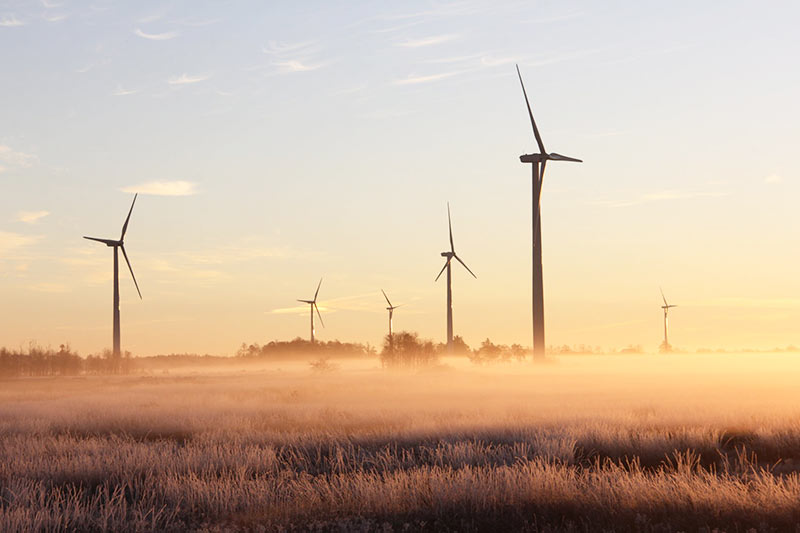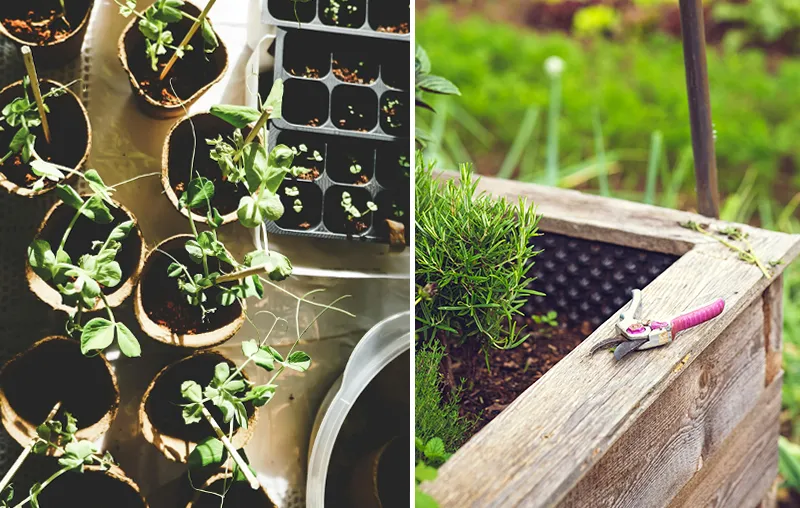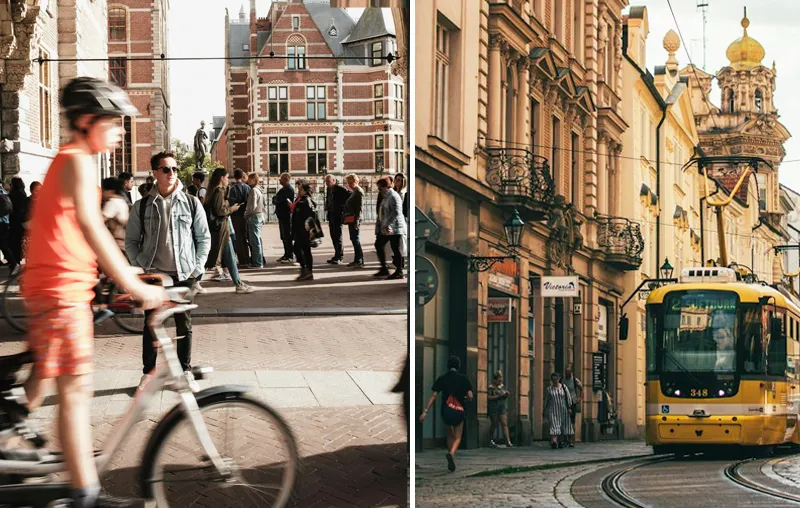Do you want to reduce your ecological footprint and are wondering what you can do to do so? Then you've come to the right place! Eating, traveling, heating or shopping - the daily behavior of every single person on this planet consumes Natural resources and pollutes the environment. For one more, for the other less.
In order to preserve the planet for us and future generations and to make the environmental impact of our personal actions measurable and comparable, the ecological footprint an important sustainability indicator has been developed. It determines the biologically productive area on our planet (with limited ecological capacity) that is necessary to maintain our own lifestyle in the long term.₁
In this article, I would like to give you some valuable tips on what you can do right now to improve your personal ecological footprint. Let's go!
Here is an overview for you:
- Reduce consumption of animal products
- Prefer regional and seasonal food
- Pay attention to the organic quality of food
- Avoid food waste
- Only use the living space you really need
- Switch to a green electricity provider and save energy
- Reduce your direct water consumption
- Prefer train, bicycle and walking
- Limit consumer behavior to necessities
- Reduce the amount of waste produced
10 tips: How can I reduce my ecological footprint?
Before we move on to the tips, you should first check your current, calculate your ecological footprint with this calculator. Please be absolutely honest in your answersso as not to falsify the test result.
Your result will be displayed in "Global hectare" (short: "gha") indicated. The value makes the footprint of people in different locations around the world with different biological productivity comparable. You will also find out, how many planets we would need if all of the world's citizens had your ecological footprint.
When testing, you will quickly notice that especially the areas of Food, housing, mobility and Consumption are decisive for your personal footprint on our planet.
Now that you have determined your value, you can reduce your ecological footprint by implementing the following tips.
Tip: Have you already heard about Earth overload day heard? It is the day of the year on which we humans have consumed more renewable resources than the earth can reproduce in an entire year. In Germany, the day in 2023 was already on May 4.₂ This fact should give you even more motivation to reduce your own share.
1. reduce your consumption of animal products

The "animal detour" is extremely resource-intensive. Animal feed, water, energy, animal suffering... all this is necessary in order to be able to consume meat, eggs, fish and cow's milk. Even the Deforestation of the rainforests is largely due to the cultivation of animal feed and the production of pastureland.
Who Environmental sins in everyday life should therefore eliminate animal-based foods from their own menus. The fewer animal products you consume, the smaller your ecological footprint. There are not only ecological, but also health and ethical reasons for this.
Further contributions:
- Why go vegan? The most important reasons
- Stopping factory farming - what everyone can do
- Vegan for people - Why veganism also promotes human rights
Are you already vegan? Then you can help other people do the same, Prejudices against the vegan lifestyle file.
2. prefer regional & seasonal foods
If you consciously pay attention to regionality and seasonality when shopping for food, you support the local economy. At the same time, your purchases become increasingly climate-friendly, as No long transportation routes, energy-guzzling cold chains or heated greenhouses necessary are.
Your virtual water consumption (indirect water consumption, e.g. for watering your food) is also significantly lower as a result. Simply pay attention to regional seals and use a seasonal calendarto always have an overview of which foods are in season.
Further contributions:
3. pay attention to the organic quality of your food
Organic certified food is generally more environmentally friendly than products from conventional production. Especially because no or less pesticides used become the essential cause of the Species extinction are.
"Organic" may be a little more expensive, but it is also healthier and more sustainable. If you want to reduce your ecological footprint, you should definitely stick to the reliable Organic Seals orient
Keep in mind, however, that organic meat is still meat and is also produced in a very resource-intensive way. A Organic product is therefore not automatically environmentally friendly - but it is generally more environmentally friendly than its conventionally produced counterpart.
Further contributions:
- Buying organic food at a low price - how it works
- Organic farming - what is it actually?
- Sustainable pest control - the natural way
Good to know: Something also needs to change in terms of economic policy. At the moment, the healthier and ecologically better option in the supermarket is often the most expensive and less available. However, it should be the cheaper and more widely available option in order to Protecting the environment in our everyday lives.
4. avoid food waste
The global food waste Causes about 8 percent of total man-made greenhouse gas emissions₃ and thus contributes significantly to the climate change with. This is a value that should not even have to arise. Especially in our western Affluent society It is far too easy for us to throw away food because most Always available (and at any time of year) are.
Growing, producing, processing, transporting and storing food is extremely resource-intensive and costly. For a better ecological footprint, appreciate this effort as if you had made it yourself.
Further contributions:
5. only use and heat the living space you really need
Heating your home not only costs a lot of money - excessive energy consumption and the use of limited raw materials such as oil and gas also harm the environment. A smaller living space could be heated more cheaply and in a more environmentally friendly way.
So pay attention to this the next time you move, that the apartment of your choice is not bigger than it needs to be. Of course, this also applies to house construction. It is also advisable to use modern technologies such as a Geothermal heating if you have the opportunity.
What's more, you don't always have to turn the heating up "full blast". Sometimes it's enough to simply put on a sweater! Always try everything you can to keep the to keep the heat energy used inside the house during the cold season. In the hot summer months, it is also important to darken the windows to avoid the use of energy-intensive air conditioning.
Further contributions:
6. switch to a green electricity provider and save energy

If you want to reduce your ecological footprint, you should definitely switch to green electricity. Whether coal or solar power - your smartphone may charge just as quickly. The main difference between electricity from fossil fuels and regenerative energy sourcesbut is to be found in its consequences for the planet.
A Switch to a green and independent green electricity provider* takes only five minutes and can easily save 1.9 tons of CO2 per year for a three- to four-person household.₄ There are few tips that are easier to implement to improve your own ecological footprint.
You should also in the household consciously Save electricity. For example, by purchasing energy-efficient household appliances, switching off your PC, TV and unnecessary artificial light sources completely, cooking with a lid or air-drying your laundry.
Further contributions:
7. also reduce your direct water consumption
Every German uses around 120 liters of water a day directly from their own tap₅ - excluding the virtual water consumption for food production. (already mentioned above)
How much water (especially hot water) you use for Body care, the Toilet flush, the Cooking or the Watering the garden is a decisive factor for your ecological footprint.
For example, turn off the water when you soap up, use just the small button to do a little business on the toilet - and collect rainwater to water your plants in the garden.
Further contributions:
- Reduce water consumption - it's that simple
- Water scarcity - definition, causes, consequences and solutions
8. prefer train, bike & walking
Around 4.9 percent of global warming can be attributed to CO2 emissions from air traffic.₆ So it's no wonder that flying to the other side of the world - and of course the many Short-haul flights - have an extremely negative impact on your ecological and CO2 footprint.
Also Car trips do not cut a good figure. If you have the option, you should therefore use public transport, the train, the bike and ideally the Walk on foot prefer. The more you exercise, the healthier and more environmentally friendly your life will generally be.
Of course, flights and car journeys cannot always be avoided. I have a few tips for you on this too: If you fly, then at least offset your greenhouse gas emissions. Experience preferred Destinations in Germany and Europe, exchange diesel or gasoline engine for a Electric car and form Carpools with other people to reduce the ecological footprint of you and your work colleagues at the same time.
Further contributions:
- Sustainable driving - how it works
- Is it possible to fly environmentally friendly?
- Good reasons to get on your bike more often
9. optimize your consumption behavior to what is necessary
How often do you buy a new smartphone or new shoes? And do you ever buy something used? Think and live minimalist in any caseto reduce your ecological footprint. Don't buy every new thing and don't chase after every new trend, but rather cherish and value the things you have. And if possible, reduce your possessions to the items that you really - I mean REALLY(!!) - need.
Use instead of own (Sharing) is a good alternative so that you don't have to do without anything. Swapping, sharing, borrowing, repairing and making things yourself are other important basic rules for more ecological consumer behavior.
Further contributions:
- Why you save money through sustainability
- Sustainable online shopping - how it works
- Long-lasting fashion - making clothes last longer
- Slow fashion - how to deal with clothing sustainably
Notice: Also remember that pets worsen your ecological footprint. The more pet food and water they need, the less sustainable your own everyday life will ultimately be. For example, how you can reduce the Reduce your dog's carbon footprintI explain in the linked blog article.
10. reduce the amount of waste you produce

Plastic waste in the environment is one of the biggest environmental problems of our time. The waste we produce (whether plastic, waste paper or electronic waste) also makes for a worse ecological footprint. So if you want to improve it, you should act in the spirit of the Zero Waste Lifestyle produce as little waste as possible. Not only because the waste causes great damage to the environment, but also because it has to be recycled or incinerated at great expense.
If you want to reduce your ecological footprint, you should increasingly unpacked and plastic free shopping. Borrow magazines instead or read them digitally. There are endless ways to avoid waste. Evaluate your waste garbage can after a week to see your savings potential at a glance.
Further contributions:
- Zero waste tips - avoid waste in a targeted manner
- Living plastic-free - the most important tips
- Zero waste for beginners
It's really easy to reduce your ecological footprint!
You have now learned many useful tips for a more environmentally friendly everyday life. Simply put them into practice one by one - and then simply do the test again. I can guarantee - also from my own experience - that your ecological footprint will improve.
"Nobody made a greater mistake than he who did nothing because he could do only a little."
Edmund Burke (more at Environmental protection quotes)
Please be aware that your gha value does not have to be zero. You don't have to do anything perfectly - continuous improvement will also get you to your goal. Every step in the right direction is better than doing nothing at all. I still have a lot of room for improvement, even though I deal with environmental protection and sustainability every day.
And another thing: it's just great that you're doing everything you can to keep your Making life more sustainable! That's half the battle for an increasingly environmentally friendly society. The other half is your "political handprint" represent. Use the time at school, at work or in your community to make even more people aware of how easily they can protect our planet every day.
Do you have any questions, suggestions or other tips and ideas for a better ecological footprint? Then please write me a comment.
Stay sustainable,

PS: You can get more tips in the Environmental protection blog. Learn there for example, what you can do about air pollution. Good luck!
References:
₁ Wikimedia Foundation Inc: Ecological Footprint, available at https://de.wikipedia.org/wiki/Ökologischer_Fußabdruck. [16.06.2023].
₂ Germanwatch e.V.: Earth Overshoot Day (as of 04.05.2023), available at https://www.germanwatch.org/de/overshoot. [16.06.2023].
₃ European Parliament: Food waste in the EU: Millions of tons of food end up in the bin (infographic, as of 15.05.2017), available at https://www.europarl.europa.eu/news/de/headlines/society/20170505STO73528/lebensmittelverschwendung-in-der-eu-infografik. [16.06.2023].
₄ Kathrin Fromm: 5 tips on how to reduce your ecological footprint (as at: 17.01.2018), available at https://www.nationalgeographic.de/umwelt/2018/01/5-tipps-wie-sich-der-oekologische-fussabdruck-verkleinern-laesst. [16.06.2023].
₅ BMU (2017): Drinking water (as at: 23.08.2017), available at https://www.bmuv.de/themen/wasser-ressourcen-abfall/binnengewaesser/trinkwasser. [16.06.2023].
₆ Bund für Umwelt und Naturschutz Deutschland e. V. (BUND): Die wahren Kosten des Fliegens: Klimakiller. https://www.bund.net/themen/mobilitaet/infrastruktur/luftverkehr. [16.06.2023].









